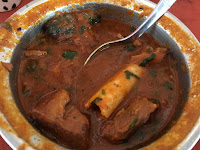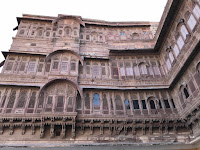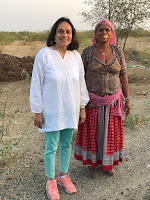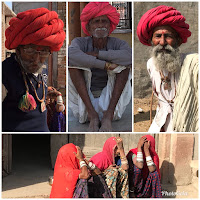Colourful RAJASTHAN – A dream come true
Our trip to Rajasthan in end-Jan/early-Feb of 2018
was a dream come true and a perfect start to 2018.
Having just 6 nights to explore, we limited
ourselves to 3 towns / cities with Kumbhalgarh being the first. Though not a
town on most tourists’ lists as there is so much else to see in this vast
state, I would highly recommend it, not least because of the Kumbhalgarh Fort, a UNESCO World Heritage Site since 2013. Built during the 15th
century by Rana Kumbha and enlarged throughout the 19th century,
this was the birthplace of the great king and warrior of Mewar, Maharana
Pratap. The perimeter of the wall extends over 36 km long making it the second
longest continuous wall in the world, only behind the Great Wall of China.
Importantly, the fort remained impregnable to direct assault. A good time to
explore the fort is around 4.00 p.m. as one can remain for the Sound and Light
Show which takes place every evening from 6.45-7.30 p.m, to see the fort lit up
at night. Though we did not have time to explore it, another key attraction is
the Kumbhalgarh wildlife sanctuary where night tours are popular. We did however,
visit the ‘Hammeripal Lake’ to feed the thousands
of African catfish that reside there. It was a sight to behold!

Kumbhalgarh also dished up two of our best meals of our trip. The first was at the restaurant in The Aodhi Hotel, one of the heritage hotels of India, so comes highly recommended. It was here that we were introduced to ‘laal maas’. It was melt-in-your-mouth delicious to say the least, so more than lived up to expectations. The service was impeccable to boot so it was worth every penny. The second great meal was at a little, nondescript vegetarian restaurant called Shreeji, not far from our abode, the Club Mahindra Fort. This is also considered a heritage hotel, in beautiful surroundings.
 Then it was on to Jodhpur, also known as the Blue
City for its cerulean-painted houses. One thing about travelling in Rajasthan
is that it involves a lot of driving between the different destinations, which
can be tiring. We reached Jodhpur by lunch time and headed off to explore the
much touted Mehrangarh Fort and Jaswant Thada. As it turns out, they were the
most impressive of all the monuments we visited on this trip. The former is one
of the largest forts in India, built around 1460 by Rao Jodha, the founder of
Jodhpur. One year after his accession to the throne, he decided to move his
capital to a more secure location as the 1000-year-old Mandore Fort was no longer
considered safe. Entry to the fort is via a series of 7 gates or ‘pols’. There
are several palaces within its boundaries famed for their intricate carvings
and courtyards such as Moti Mahal, Phool Mahal, etc. The pictures speak for
themselves. The museum was fabulous too and is supposedly one of the most
well-stocked museums in the state.
Then it was on to Jodhpur, also known as the Blue
City for its cerulean-painted houses. One thing about travelling in Rajasthan
is that it involves a lot of driving between the different destinations, which
can be tiring. We reached Jodhpur by lunch time and headed off to explore the
much touted Mehrangarh Fort and Jaswant Thada. As it turns out, they were the
most impressive of all the monuments we visited on this trip. The former is one
of the largest forts in India, built around 1460 by Rao Jodha, the founder of
Jodhpur. One year after his accession to the throne, he decided to move his
capital to a more secure location as the 1000-year-old Mandore Fort was no longer
considered safe. Entry to the fort is via a series of 7 gates or ‘pols’. There
are several palaces within its boundaries famed for their intricate carvings
and courtyards such as Moti Mahal, Phool Mahal, etc. The pictures speak for
themselves. The museum was fabulous too and is supposedly one of the most
well-stocked museums in the state.  Just nearby is the Jaswant Thada,
a cenotaph built by Maharaja Sardar Singh in 1899 in memory of his
father, Maharaja Jaswant Singh. It serves as the cremation ground for the royal
family of Marwar. The mausoleum is built out of intricately carved sheets
of marble which are extremely thin and polished so that they emit a warm glow
when illuminated by the sun.
Just nearby is the Jaswant Thada,
a cenotaph built by Maharaja Sardar Singh in 1899 in memory of his
father, Maharaja Jaswant Singh. It serves as the cremation ground for the royal
family of Marwar. The mausoleum is built out of intricately carved sheets
of marble which are extremely thin and polished so that they emit a warm glow
when illuminated by the sun. We kicked off Day 2 in Jodhpur with a visit to the
impressive Umaid Bhawan Palace, one of the world’s largest private residences.
Thereafter it was on to Sardar Market, close to the clock tower, which is one
of the major landmarks of the city. The narrow lanes are adorned with shops
(estimated to number around 7000!) selling all manner of handicrafts, spices,
tea, etc. which made for an enjoyable excursion. The highlight though was the
stepwell, Toor Ji Ka Jhalra. Built in 1740s, this historic structure
was only recently excavated and restored and will leave you awestruck. No
surprise then that it has made it to the list of ‘most beautiful stepwells in
India’ (http://www.themysteriousindia.net/12-beautiful-stepwells-india/). We
picked up a few pairs of ‘mojaris’ or embroidered, leather shoes and some
spices from the market as souvenirs.
We kicked off Day 2 in Jodhpur with a visit to the
impressive Umaid Bhawan Palace, one of the world’s largest private residences.
Thereafter it was on to Sardar Market, close to the clock tower, which is one
of the major landmarks of the city. The narrow lanes are adorned with shops
(estimated to number around 7000!) selling all manner of handicrafts, spices,
tea, etc. which made for an enjoyable excursion. The highlight though was the
stepwell, Toor Ji Ka Jhalra. Built in 1740s, this historic structure
was only recently excavated and restored and will leave you awestruck. No
surprise then that it has made it to the list of ‘most beautiful stepwells in
India’ (http://www.themysteriousindia.net/12-beautiful-stepwells-india/). We
picked up a few pairs of ‘mojaris’ or embroidered, leather shoes and some
spices from the market as souvenirs. After lunch at ‘On The Rocks’ (very overpriced with
poor service so stay clear!), we rested at our hotel before embarking on a
Bishnoi village safari, one of the highlights of our trip. It was lovely seeing
the friendly villagers go about their tasks, with one lady volunteering to be
photographed with me (for a small fee😊). Driving from village to village, we were fortunate to see not only
several deer in the Guda Bishnoi village, but also the rare black buck, made
famous by the Salman Khan poaching case! Another highlight was catching the
sunset at the Guda Bishnoi Lake where we saw several migratory birds. A visit
to a local dhurrie-maker rounded up our village safari.
After lunch at ‘On The Rocks’ (very overpriced with
poor service so stay clear!), we rested at our hotel before embarking on a
Bishnoi village safari, one of the highlights of our trip. It was lovely seeing
the friendly villagers go about their tasks, with one lady volunteering to be
photographed with me (for a small fee😊). Driving from village to village, we were fortunate to see not only
several deer in the Guda Bishnoi village, but also the rare black buck, made
famous by the Salman Khan poaching case! Another highlight was catching the
sunset at the Guda Bishnoi Lake where we saw several migratory birds. A visit
to a local dhurrie-maker rounded up our village safari.  Finally
it was on to our final destination, Udaipur. Enroute, we visited the Ranakpur
Jain Temple, made of light-colored marble. Over
1444 marble pillars, carved in exquisite detail, support the temple, with no
two pillars the same. The Eklingji temple and the remains of the Sahastra Bahu
Temples (not far from Nagda) are also worth a visit. The latter are now in
partial ruins, but are still indicative of their original splendour, artisanry
and perfect geometry.
Finally
it was on to our final destination, Udaipur. Enroute, we visited the Ranakpur
Jain Temple, made of light-colored marble. Over
1444 marble pillars, carved in exquisite detail, support the temple, with no
two pillars the same. The Eklingji temple and the remains of the Sahastra Bahu
Temples (not far from Nagda) are also worth a visit. The latter are now in
partial ruins, but are still indicative of their original splendour, artisanry
and perfect geometry.
Of course, every key city in Rajasthan has its
palaces and forts and City Palace,
Udaipur, was the last one we visited. It was built over a period of nearly 400 years, with contributions from several rulers of the Mewar dynasty, with construction starting in 1553. Having visited the Mehrangarh Fort in Jodhpur, this palace was no match, though admittedly way more impressive from the inside than the outside. Within the grounds, located inside the Fateh Prakash Palace, Crystal Gallery is the largest private collection of crystal in the world. It was established by Maharana Sajjan Singh who ordered the crystal collection from the Birmingham-based F&C Osler company in 1877. Unfortunately, he died before it arrived and all the crystals remain packed in the boxes for 110 years. The Crystal Gallery was opened to the public in 1994 and exhibits precious crystal items brought from various parts of the world, including a dining table, a sofa set and a crystal bed. A must-visit when in Udaipur.
Udaipur, was the last one we visited. It was built over a period of nearly 400 years, with contributions from several rulers of the Mewar dynasty, with construction starting in 1553. Having visited the Mehrangarh Fort in Jodhpur, this palace was no match, though admittedly way more impressive from the inside than the outside. Within the grounds, located inside the Fateh Prakash Palace, Crystal Gallery is the largest private collection of crystal in the world. It was established by Maharana Sajjan Singh who ordered the crystal collection from the Birmingham-based F&C Osler company in 1877. Unfortunately, he died before it arrived and all the crystals remain packed in the boxes for 110 years. The Crystal Gallery was opened to the public in 1994 and exhibits precious crystal items brought from various parts of the world, including a dining table, a sofa set and a crystal bed. A must-visit when in Udaipur.
 One can’t leave Rajasthan without having eaten
dal-bati, so after a quick stop at the vintage car museum, we headed to lunch
at the nearby Krishna Dal-Bati Restro. Yummy but boy was it heavy! Definitely
called for some R&R before our evening boat ride on Lake Pichola and a romantic
dinner at Jhumar restaurant, overlooking Fateh Sagar Lake. After all, Udaipur
is called the ‘City of Lakes’ 😊.
One can’t leave Rajasthan without having eaten
dal-bati, so after a quick stop at the vintage car museum, we headed to lunch
at the nearby Krishna Dal-Bati Restro. Yummy but boy was it heavy! Definitely
called for some R&R before our evening boat ride on Lake Pichola and a romantic
dinner at Jhumar restaurant, overlooking Fateh Sagar Lake. After all, Udaipur
is called the ‘City of Lakes’ 😊. Apart from the amazing structures, the best
part of the trip was driving through small villages, witnessing the colourful,
village life and people first-hand. It was all we expected it to be and more.
Our driver, Hari Ram, was amazing at getting us the best photo opportunities
with locals in turbans, camels and everything one associates Rajasthan with. Experiences
like drinking tea cooked on coals in Busi village and trying my hand at
dhurrie-making will forever remain etched in my memory.
Apart from the amazing structures, the best
part of the trip was driving through small villages, witnessing the colourful,
village life and people first-hand. It was all we expected it to be and more.
Our driver, Hari Ram, was amazing at getting us the best photo opportunities
with locals in turbans, camels and everything one associates Rajasthan with. Experiences
like drinking tea cooked on coals in Busi village and trying my hand at
dhurrie-making will forever remain etched in my memory.
So it was with a tinge of sadness that we ended
our maiden trip to this colourful state and we hope to return to explore other
parts someday…


